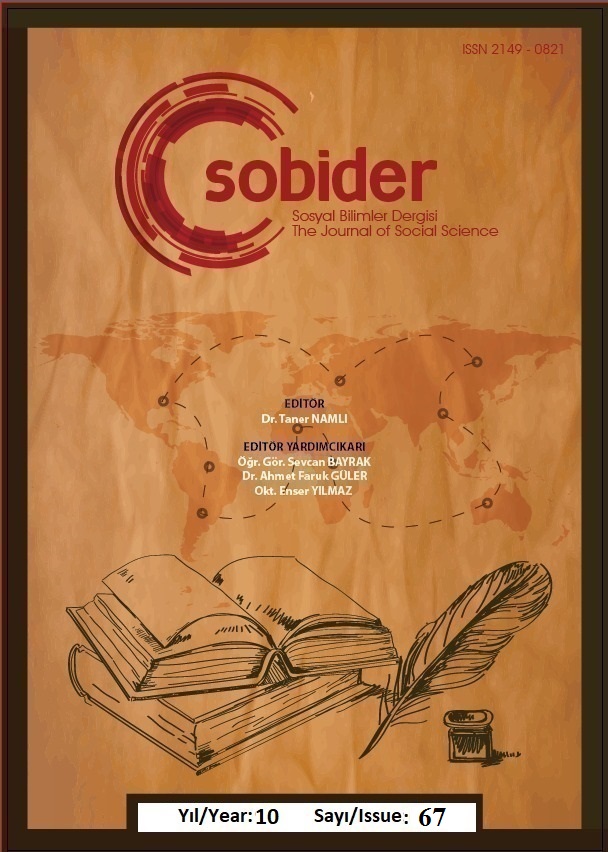Author :
Abstract
Mûsevîlik ve Îsevîlik inancında Hz. Nûh’un elçi olarak gönderildiği toplum, bir diğer bakış açısıyla “Nûh oğulları” yedi temel emre-yasağa uymakla sorumlu tutulmuştur. Bunlar; “Allâh’a şirk koşmamak, yalnızca O’na kulluk etmek, cinayet, hırsızlık ve zina suçlarından uzak durmak, âdil olmak ve canlı hayvan eti yememek”tir. Aslında bahse konu emirler Hz. Âdem’den itibaren hep geçerli olan genel hükümlerdir. Bu çalışmada söz konusu emir ve yasakların Kur’ân-ı Kerîm’de açık veya zımnî karşılıklarının varlığı ve ifade yöntemleri araştırılacaktır. Araştırmada doğrudan Hz. Nûh’u muhatap alan âyetlere ek olarak Kur’ân’da ifade edilen hadd cezaları, İslâm’ın mekâsıd-ı şerîa-ı esâsiyyesi (beş esas-yasa), Nûh kavminin helâk sebepleri, taptıkları putların sembolik anlamları yanında diğer bazı peygamberlerin genel vasiyetleri dikkate alınacaktır. Çünkü suç ile suça sevk eden etkenler, verilecek ceza ve ilâhî azab arasında mutlak ilişki vardır. Konunun günümüze yansıyan hususlarından biri, söz konusu yasaların, kurulması planlanan ve kısmen uygulanmaya başlayan “yenidünya düzeni”nin araçlarından biri olmasıdır. Dolayısıyla güncellenen bu konu, dinî, kültürel-siyasî arka plan dikkate alınmadan değerlendirilemeyecek boyuttadır. Bu sebeple çalışmamız dinî arka plan bağlamında şu üç soruya bir cevap denemesini de içermektedir: 1. Her dinin ana gayesi ve genel manada anlattıkları aynıysa Allâh niçin tekrar tekrar yasalarını anlatan kitaplar göndermiştir? 2. İnsanlığı huzura kavuşturacak ilkeler hadd-i zatında sınırlı sayıda ve çok açık ilkeler ise neden ilâhî kitaplar beklenenden geniş hacimli olmuşlardır. 3. Anlattıkları ve öğüt verdikleri hep aynı şeyler ise bu kadar çok peygamberin gelmesinin sebebi nedir? Doküman analizine dayalı nitel bir çalışma olan bu araştırmada karşılaştırmalı çözümleme metotları kullanılmıştır.
Keywords
Abstract
According to the cultures of Judaism and Christianity, to which Noah was sent as a messenger, "Noah's sons" were held responsible for obeying seven basic orders and prohibitions. These laws are as follows: not to associate partners with Allah, to worship only Him, to stay away from the crimes of murder, theft and adultery, to be just and not to eat live animal meat. Normally, these laws are general provisions that have been valid since Adam. In this study, the existence of express or implied equivalents of orders and prohibitions in the Qur'an and their expression methods will be examined in the context of our subject. In our study, the verses that directly address Noah will be examined, as well as the hadd punishments expressed in the Qur'an, the principles of Islamic Sharia, the reasons for the destruction of Noah's people, the symbolic meanings of the worshiped idols and the advice of some prophets will be discussed. One of the aspects of the subject that is reflected today is that the laws in question are one of the tools of the "new world order" that was planned to be established and partially put into practice. Therefore, this updated issue is of such a dimension that it cannot be evaluated without considering its religious, cultural-political background. For this reason, our study tries to answer the following three questions in the context of religious background: 1. If the basic purpose and general lines of each religion are the same, why has Allah sent down new books describing his religion? 2. If the principles that will bring peace to humanity are limited and clear, why do the divine books consist of long texts? 3. If they always say the same things and give advice, why have so many prophets been sent to humanity as ambassadors?
